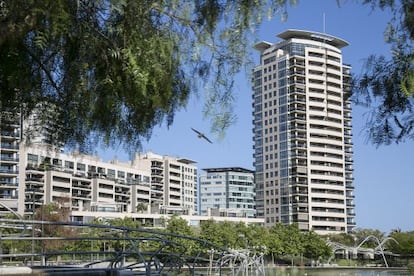Spain’s “golden visa” scheme attracts just 81 investors in first seven months
New law aimed at bringing in foreign entrepreneurs has got off to a less-than-glittering start Offer has mainly appealed to those wanting to buy cheap property

Fewer than 100 of the world’s super-rich have taken advantage of the Spanish government’s offer of a residency permit in return for investing in the national economy or buying property in Spain. The so-called “golden visa” scheme was introduced in September 2013, aimed at foreigners buying properties worth more than €500,000; investing €1 million or more in shares of publicly traded Spanish companies; depositing at least €1 million in a Spanish bank account; or making a major business investment leading directly to meaningful job creation, or having significant socioeconomic or technological impact.
The government says it has issued 81 visas on the basis of people meeting these requirements, and that 72 of the cases involved property purchases.
Almost half of the new residents are Chinese and Russian millionaires, with the remainder coming from Ukraine, Lebanon, Ecuador, Qatar, Egypt and Iran, among others.
The new visas do not come with a work permit, or include family members or spouses (though these may apply separately); nor are beneficiaries required to live in Spain – although they must visit the country at least once a year. They will, however, be allowed to move freely through the Schengen Area.
Almost half of the new residents are Chinese and Russian millionaires
The stated aim of the residency permit deal, included among other measures within the so-called Entrepreneur’s Law of September 2013, was to attract inward investment to Spain, but of the 81 visas, only three are related to the setting up of a business, and only six are connected with capital investments. Other EU states such as the United Kingdom, Portugal, Greece and Malta have created similar schemes.
Egyptian businessman Mustafa W. said he was attracted by the bargains to be found in Spain’s ailing property sector. Acquiring residency was a key factor in his decision to choose Spain: “The country has beaches, nice cities, and its prices are much lower than other European countries,” says the 33-year-old by phone from Cairo. He recently bought a property in Barcelona’s upmarket Diagonal Mar neighborhood through real estate company Lucas Fox, which teamed up with law firm Écija to help process visa applications.
“There has been a lot of interest in the scheme, particularly from Arab countries. When people are mainly looking for a visa, they tend to prefer buying property to setting up a business or buying bonds,” says Écija’s Gabriel Nadal.
Recipients are initially given a visa for one year, during which time they are not allowed to work. The visa is then extended to two years, allowing them to work, renewable thereafter. Applicants undergo thorough police checks, says the government, which turned down 14 requests.
The government says that it has turned down 14 visa requests
The government rejects the term “golden visa,” saying the goal of the scheme is to attract investment that will generate employment, and pointing out that visa requirements have been relaxed or sped up for a range of other professionals. “The law is about attracting productive investment and talent, and has made it easier to reside in this country not just for investors, but also entrepreneurs, directors and scientists,” says an Immigration Department spokesman, pointing out that almost 650 other visas have been granted or extended to researchers, scientists and business people from overseas.
The government’s figures suggest that the new visa holders will have spent at least €43 million on property, along with at least a further €6 million on purchasing bonds. It adds that the visa scheme will have created around 640 jobs, and around €40 million in investments, mainly in high-tech industries.
David Díaz of consultancy firm Baker & McKenzie, which has advised applicants interested in the visa scheme, says the appeal of Spain is “the size of its economy.” His colleague Margarita Fernández says she expects interest in the scheme to increase in the coming months.
Tu suscripción se está usando en otro dispositivo
¿Quieres añadir otro usuario a tu suscripción?
Si continúas leyendo en este dispositivo, no se podrá leer en el otro.
FlechaTu suscripción se está usando en otro dispositivo y solo puedes acceder a EL PAÍS desde un dispositivo a la vez.
Si quieres compartir tu cuenta, cambia tu suscripción a la modalidad Premium, así podrás añadir otro usuario. Cada uno accederá con su propia cuenta de email, lo que os permitirá personalizar vuestra experiencia en EL PAÍS.
¿Tienes una suscripción de empresa? Accede aquí para contratar más cuentas.
En el caso de no saber quién está usando tu cuenta, te recomendamos cambiar tu contraseña aquí.
Si decides continuar compartiendo tu cuenta, este mensaje se mostrará en tu dispositivo y en el de la otra persona que está usando tu cuenta de forma indefinida, afectando a tu experiencia de lectura. Puedes consultar aquí los términos y condiciones de la suscripción digital.









































